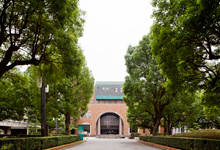Chiba University of Commerce sets environmental targets for important social issues such as global warming countermeasures, and makes the amount of energy generated at the university-owned mega solar Noda power plant, etc. equal to the amount of energy consumed at the Ichikawa campus. He announced that he would aim to become a "100% renewable energy university".
Chiba University of Commerce has built the largest "Mega Solar Noda Power Plant" in Japan on its own land in order to contribute to environmental conservation such as global warming countermeasures. In April 2014, we started the "solar power generation business" to sell the generated electricity to TEPCO. In FY4, about 2016 ordinary households * generate about 800 million kWh of electricity annually, which is equivalent to the amount of electricity used in one year, and are working to promote renewable energy. * Assumed annual power consumption of about 1kWh per household
The goals set by Chiba University of Commerce this time are as follows.
・ 2018 target
Make the amount of power generated by the Mega Solar Noda Power Plant and the "power consumption" of the Ichikawa Campus the same, making it Japan's first "RE100 (100% renewable energy) university" online.
・ 2020 target
Make the amount of power generated by the Mega Solar Noda Power Plant and the "energy consumption" of the Ichikawa Campus the same, making it Japan's first "100% renewable energy university" online.
Efforts to achieve this goal are the first universities in Japan to register on the platform after being reviewed by the global initiative "100% Renewable Energy Platform: Operation CAN-Japan *" that advocates the realization of 100% renewable energy. Was (dated November 2017, 11).Furthermore, starting from this initiative, the university established "CUC Energy Co., Ltd." as an energy business for local production for local consumption that brings sustainable benefits to the region, and started a business of leasing energy-saving equipment to the university. bottom.
The university will continue to collaborate with CUC Energy Co., Ltd. to provide comprehensive energy-saving services in addition to the concept of buying and selling local renewable energy, including electricity generated at the university as a local retail electric power company. We plan to develop businesses that contribute to customer interests, revitalization of the local economy, proposals for regional policies, and conservation of the global environment.
* CAN-Japan is the Japan base of Climate Action Network (CAN), an international network organization consisting of 120 environmental NGOs from more than 1,100 countries working on climate change issues.

